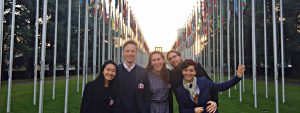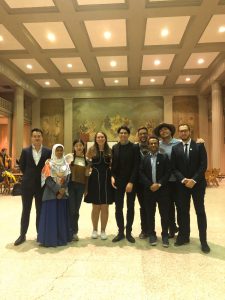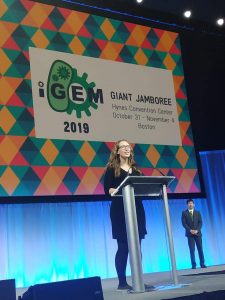Security: A Journey From Fear to Love
My introduction into the world of international security was pretty bleak. Not the context of the introduction, but the content. My story begins in 2017 when I had the amazing opportunity to go to the Biological Weapons Convention (BWC) as an International Genetically Engineered Machine (iGEM) delegate. Attending the BWC was one of the most terrifying, and empowering, experiences of my life. It set me on a path that was at first dominated by my fear of biological weapons and other emerging technologies. But, as I continued, I discovered that fear was a much weaker motivator than love of humanity and a desire to see it flourish.
To give some background, iGEM is an international genetic engineering competition that empowers students to expand their scientific thinking, as well as explore the societal impact of their science. I joined MIT’s iGEM team because it was an incredible opportunity to work with ten other undergraduates on a project of our own design in a field that I was passionate about. Our project worked on correcting an error in cells that caused a form of lung cancer. A big emphasis of our work was communicating about our project to the public. This work was incredibly meaningful to me, because that summer my grandfather was undergoing experimental cancer treatment and my experience in iGEM gave me the tools to explain to him what was happening.
After participating in the competition, I was selected as one of five iGEM delegates to attend the BWC that year. Our delegation was there to present on the safety considerations in our cutting-edge research to UN ambassadors. My presentation was on safeguarding gene editing technology, implementing wide-spread tracking of biological reagents, and the importance of doing effective outreach. We came ready to discuss emerging biotechnologies, such as gene editing or DNA printing, but the technical conversation at the BWC lagged several years behind the science that we were presenting. Furthermore, much of the time during the BWC was spent attempting to resolve budget issues, and the meeting ended in a stalemate because they could not achieve consensus. It was quite the introduction to the world of biosecurity.
I returned from that trip with a sense of responsibility born from fear that if I, as a scientist, did not engage with policymakers the world would be doomed. I felt that the scientific community was leapfrogging into a new future fraught with danger. This fear was incredibly motivating and it dictated my actions; I began by taking more political science classes, and reaching out to biosecurity experts. Over the following few months, I came to realize the contentious relationship between the contemporary generation of emerging leaders and the current generation of policymakers. I believe a main contributor to this divide is a lack of communication and subsequent misunderstandings of the motivation of the other side.
Inspired by a desire to close this sector wide gap, I put together a Biosecurity Policy Conference in collaboration with iGEM and the MIT Center for International Studies. The conference began with a simulation in which students were teamed up with policymakers to respond to the following scenario: The CDC had just received word that a highly contagious, engineered pathogen was spreading in mice in the fields outside Savannah, Georgia. The participants were tasked with creating a plan to contain the virus, as well as crafting a statement to give the press that informed the public without inciting fear. This exercise sparked desired conversation and provided a common language for both young scientists and the experienced policy makers. It also helped everyone understand how prepared the world is for one of these attacks. The second half of the conference was more traditional, with panels of policymakers and scientists involved in the policy process speaking about challenges they faced.
The conference accomplished my goal which was for students to feel responsible for their role in reducing the risks of their future work as part of a larger security and science community. It was planning this conference that empowered me to pursue the Scoville fellowship as the next step of my career. I wanted to come to DC to find a productive outlet for my passion, and to help be a part of the solution to the problems I saw.
Arriving in Washington I was ready to sit down with my colleagues and discuss all the ways in which the world would end. However, very soon into my fellowship, I realized that many of my mentors did not share my fears. To clarify, it is not that they think that the issues I pointed out were unimportant, rather they maintain an infectious sense of optimism about the future. Fear is an exhausting motivator. My impression is that my fearful predecessors did not make it very far before reaching the dreaded “burn out” many professionals face. So I decided to try my hand at being an optimist. It took some time, but my language slowly shifted from the risks presented by emerging technology to the amazing opportunities we can unlock if we allow our technology to flourish while we work to secure it and respond to human need and wellbeing. For my fellowship, I am helping the Carnegie Endowment launch a new project to study the intersection of bio and cybersecurity policy. My goal is to make sure that biological data is secure, so that it can be used to improve human and planetary health.
While I am not yet a full-blown optimist, the transition has been easier than expected. I realized that my idealism is rooted in the same experience as my fear, my trip to the BWC. When I originally found out that I was selected to go to the BWC, I went to visit my grandfather in hospice. He told me that my job was to make sure that nobody was left behind as society moved into the future. He passed away the week before I left for Geneva, now, more than ever, his last words mean a great deal to me. These words stuck with me and provided the first of many seeds of love I have since experienced. And that love has continued to grow, so now my goal is not to prevent catastrophe for fear of a humanity ending event, but out of love for humanity and a desire to see it prosper.
Ronit Langer is a Spring 2020 Scoville Fellow at the Carnegie Endowment for International Peace.`



